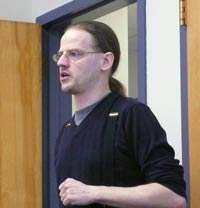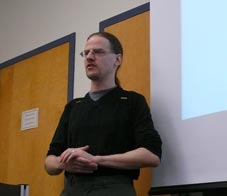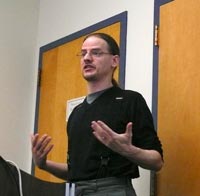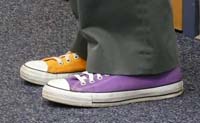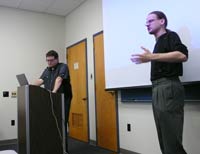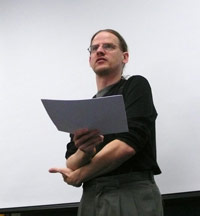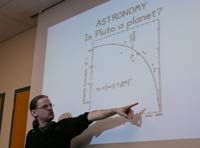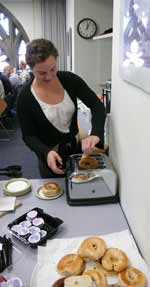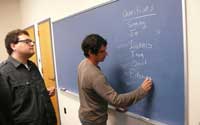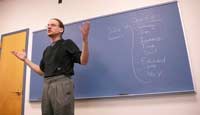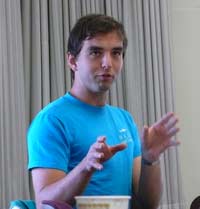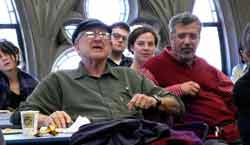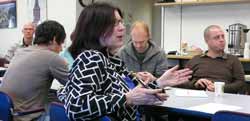
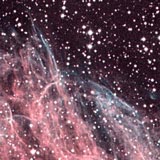
![]()
home
::: about
::: news
::: links
::: giving
::: contact
![]()
events
::: calendar
::: lunchtime
::: annual
lecture series
::: conferences
![]()
people
::: visiting fellows
::: postdoc fellows
::: senior fellows
::: resident fellows
::: associates
![]()
joining
::: visiting fellowships
::: postdoc fellowships
::: senior fellowships
::: resident fellowships
::: associateships
![]()
being here
::: visiting
::: the last donut
::: photo album
::: center home >> being here >> last donut? >> natural kinds |
Friday, 8 October 2010 We philosophers of science have a troubled relationship with metaphysicians. We share common interests. We both want to know about the causal connected of things, about the substances that make things, about the space and time in which they live; and much more. The metaphysician's analysis has been a continuing source of stimulating ideas. However our worry is that they know too much. There is only so much you can learn about substances by introspecting into what is essential to being. Your prospects are meager when you seek to delimit the causal connectedness of things by the convenient expedient of asking your friends what they really mean when they say this causes that. Press these simple methods too hard and you end up pre-empting the scientist, whose job it is to figure out what is the stuff of things and how they connect and interact.
We may divide nature up in many ways. There are all the things in my office right now versus everything else. There are all things made of pure gold versus everything else. The first sort of division is artificial; it picks out things that are collected mostly by happenstance. The second division is provided by the way the world is. It carves nature at the joints, to use the familiar, if gruesome, phrase. So far, so good. What more can we say beyond this last metaphor? That is when the metaphysics kicks in. What makes a natural kind, we are told, is that its properties are intrinsic. Carrying them is essential to it being what it is. If something is a natural kind, it carries the same intrinsic properties in all possible worlds. Just this talk worries philosophers of science. Just what do we mean by essential? How can we pronounce with authority about all possible worlds? Possible in what sense? What good and worthy idea could P.D. extract from these metaphysical flights? Looking around the room, I'm noticing an audience that should be friendly. There is a noticeable contingent that shares one thing in common: they all spent time in the philosophy department of the University of California at San Diego. What brought them? P.D. is one of their number.
First he needs to clear away possible distractions. The talk enters into a long list of common wisdoms about natural kinds. Most of them will be discarded. There is, he concludes, no such thing as a natural kind "simpliciter," or defined as the relata of laws, or as intrinsic properties, and more.
Soon the screen came back to life. Now came the central claim. Natural kinds are simply those things picked out by the taxonomy of some domain of investigation in which induction and explanation are supported. That is it. No more. The notion is relational. There are no natural kinds, only natural kinds with respect to this or that investigation. Call them "naturalized kinds," Bert Leuridan had earlier suggested to P.D. and me. But P.D. did not want to multiply names in vain. We already talk of natural kinds. Let's stick with that. Whatever they are called, it is nice deflation, I thought. But what can you do with your new toy? That was the question I wanted to see answered and that was what I wrote in my notebook when there was still half a talk to go. Such questions rarely get answered. However this time it was answered, in spades. P.D. now worked through a list of examples from various sciences, all illustrating his view. There was the case of species in biology; of whether there is distributed cognition that extends outside our person; whether instrumentation in science is a natural kind. His first example was my favorite, however.
The natural kind, planet, is defined relative to the astronomers investigation and Pluto. The IAU had decided through that investigation that planets must orbit the sun; be sufficiently massive to form a near sphere under their own gravity; and they must clear the neighborhood of their orbit of other masses. Pluto did the first two, but not the third. So the taxonomy of the astronomers classified it as a kind different from planet. Pluto doesn't make it all the way to planethood, only to dwarf planethood. Is the division between planet and dwarf planet purely arbitrary, so that there is nothing about nature in it? That is not so. It is quite different from an arbitrary classification of Pluto as a planet since it is one of nine objects so named in recent astronomy texts. The IAU taxonomy is grounded in astrophysics. Is it metaphysical? It is not so, in so far as it calls up no notions of intrinsicness or essence.
Sandy pressed P.D. on an issue to which others returned. It seems that anything, no matter how odd, can be a natural kind if one is willing to allow correspondingly odd investigations. P.D. was willing to defend that view. He did not know where to draw the line between worthy scientific investigations and utterly bogus ones. But you don't need to know where the line is to know you've gone too far, was Sandy's retort. P.D. held fast, quietly and politely, and that seems just right to me. If we realize that anything can end up as a natural kind, we don't get tempted by an idle metaphysics of natural kinds. John D. Norton |
